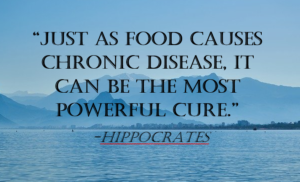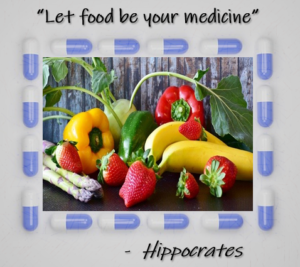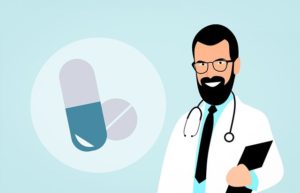 Picture it…
Picture it…
…you are sitting in your doctor’s office, worrying about why you have just been diagnosed with heart disease (or a stroke, or diabetes, or cancer).
Your mind is racing with questions about how this could have happened and what you can do to prevent it from happening again. After all, you are only in your 40’s. And, you’re worried about your children…how can you protect them from having to go through something similar?
Among your many mentally and physically exhausting trips to doctors and treatment facilities, there has been a lot of poking and prodding. There have been a lot of tests and prescriptions and procedures.
But something is missing…there has been no discussion about the #1 contributor to death and disability in the U.S. — diet. In the back of your mind, you wonder whether the foods you are eating have anything to do with this, but you quickly brush the thought aside. After all, if it was that important,
your doctors would talk to you about it, right?!
 It is true…a poor-quality diet is the leading risk factor for a variety of health issues including coronary artery disease, diabetes, cancer and others.
It is true…a poor-quality diet is the leading risk factor for a variety of health issues including coronary artery disease, diabetes, cancer and others.
However, don’t despair…the good news is a healthful diet can prevent – and even reverse – these dreaded diseases.
But, wait a minute!
Doctors are expertly trained to treat illness and disease…so, surely, they are also well equipped to address food and nutrition as part of my treatment plan, right?!
Believe it or not, the answer is mostly “NO.” In a recent article in JAMA, Dr. Stephen Devries, who is Executive Director of the Gaples Institute for Integrative Cardiology and an associate professor at Northwestern University Feinberg School of Medicine, discusses why he is working to better equip physicians to help prevent and treat illness through food and nutrition.
Dr. Devries says, “I was extremely well-trained to deal with bailing people out of very serious cardiac problems. But, I was never equipped with the knowledge about how to prevent these cardiac issues from arising in the first place.”
 How much nutrition education did Dr. Devries receive? “Essentially zero.” This included his years in medical school plus 3 years of residency plus another 4 years of cardiology fellowship…he received “zero with regards to nutrition education.” And, he says, “that incredible deficiency of nutrition education that I experienced exists exactly the same today.” And, yes, this applies to pediatricians too.
How much nutrition education did Dr. Devries receive? “Essentially zero.” This included his years in medical school plus 3 years of residency plus another 4 years of cardiology fellowship…he received “zero with regards to nutrition education.” And, he says, “that incredible deficiency of nutrition education that I experienced exists exactly the same today.” And, yes, this applies to pediatricians too.
In fact, only 27% of medical schools even offer courses in nutrition. To be accredited, medical schools must require their students to take certain courses including calculus and physics. Not to downplay the importance of these courses, but what about nutrition, the #1 contributor to death and disability? In the 40+ page document outlining the medical school accreditation requirements, how many references do you think there are to food and nutrition? You guessed it, zero.
Fortunately, there are exceptions!
- There are physicians who have made it a mission to understand how food affects health and help patients avoid drugs and expensive medical procedures simply by helping them overhaul the foods they are eating. Some schools are tackling this issue head-on, requiring increasing amounts of nutrition education and even building teaching kitchens to give students and practicing physicians hands-on experience.
- Registered dietitians, who have spent years studying and practicing nutrition, are increasingly complementing physicians in their practices. Even if a doctor isn’t an expert in food and nutrition, they can refer patients to someone who is.
Why is there so little focus on food and nutrition?
We have personally heard stories – and seen first-hand – friends and family who have been diagnosed with heart disease and various types and stages of cancer. They were treated with the best drugs and medical procedures available and we are, of course, so thankful for that. What shocked us, though, was the lack of discussion about food and nutrition. And, there were virtually zero efforts to help use food and diet to minimize the risk of recurrence. This is even despite the continually mounting evidence that the right foods (REAL foods) can contribute to preventing and treating these conditions.
Why? There are many contributing factors:
- Physicians are highly trained in how to treat illness and disease through pharmaceuticals and medical procedures. They can talk about these treatments all day long, including the risks and benefits, which is what they spend most of their time discussing with patients.
- Financial incentives. Insurance companies reimburse doctors for procedures, not for spending time helping patients prevent or treat disease by changing their diet. This is starting to change, but remains a big obstacle.
- Patients carry some of the blame. It’s a matter of supply and demand — if patients are not pressuring their medical providers to help them get healthier through food and nutrition, where is the incentive for providers to develop this knowledge? If, however, patients begin demanding this support, and are willing to switch if their provider is unable to deliver, this could help speed up change.
Give me more than “eat less and move more!”
It’s easy for doctors to start telling patients they need to change their diet and eat healthier. Maybe they even take it a step further and counsel they should “eat more fruits and vegetables” or “eat a plant-based diet.” But, will this advice help people figure out what to feed their family for dinner tonight? Or, how to enjoy a practical healthy breakfast that tastes great?
 Patients must be able to understand what “eating healthy” really means and take practical steps to put it into practice in their daily lives.
Patients must be able to understand what “eating healthy” really means and take practical steps to put it into practice in their daily lives.
That’s why we continually promote the message of – KEEP IT SIMPLE AND EAT REAL FOOD.
Through our many resources, once we help people understand what “REAL FOOD” means and help them gain the confidence to prepare these foods simply and deliciously, “eating healthy” becomes a natural part of everyday life! And, the risk of these dreaded diseases decreases significantly as a result!
What does this mean for us?
 We must take ownership of, and be accountable for, our own health! If we have that nagging question about whether our diets are affecting our health, we need to ask questions and seek out the right information. Don’t assume that, because your doctor doesn’t bring it up, it isn’t important.
We must take ownership of, and be accountable for, our own health! If we have that nagging question about whether our diets are affecting our health, we need to ask questions and seek out the right information. Don’t assume that, because your doctor doesn’t bring it up, it isn’t important.
We should also spend our money wisely. We all SPEND A LOT of money every year on insurance premiums and deductibles. The more we can do to increase demand for medical providers who can guide patients on healthy eating, increase demand for insurance companies to support these efforts and increase demand for local farmers and producers to provide even more healthful foods, the lower our collective costs will be. After all, health insurance is a big pool that we all collectively pay for. If we can reduce the size of the pool by eating healthfully and lowering these costs, we will all SAVE A LOT of money.
Healthful eating = reduced risk.
Unhealthy eating = increased risk.
 If we could just tackle this one issue – getting people to eat healthier – we could dramatically improve people’s lives and dramatically reduce the economic burden of healthcare on our society. This one change would be significantly more powerful than any drug, medical procedure or insurance reform could ever hope for!
If we could just tackle this one issue – getting people to eat healthier – we could dramatically improve people’s lives and dramatically reduce the economic burden of healthcare on our society. This one change would be significantly more powerful than any drug, medical procedure or insurance reform could ever hope for!
Talk to your medical providers about this issue! And, talk to your friends and family if you have concerns about their health. Order a copy of our new cookbook releasing in TWO weeks, just in time for Mother’s Day, which includes a 3 month free membership to www.eatrealamerica.com. No prescriptions needed, no complicated diet plan…the solution can be as simple as eating a wide variety of REAL food!
 LEARN MORE ABOUT THE NAPKIN!
LEARN MORE ABOUT THE NAPKIN!

Leave A Comment